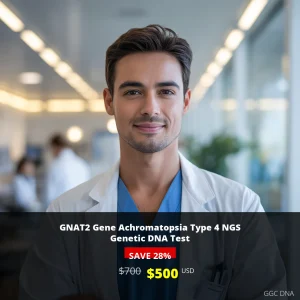FBN1 Gene Ectopia Lentis Familial NGS Genetic DNA Test
Comprehensive Genetic Analysis for Inherited Eye Disorders
The FBN1 Gene Ectopia Lentis Familial NGS Genetic DNA Test represents a breakthrough in precision medicine for diagnosing hereditary ocular conditions. This advanced genetic screening utilizes cutting-edge Next-Generation Sequencing technology to identify mutations in the FBN1 gene, which plays a critical role in maintaining the structural integrity of connective tissues throughout the body, particularly in the eye’s lens suspension system.
What Does This Test Measure and Detect?
This comprehensive genetic analysis specifically targets the FBN1 gene, which encodes fibrillin-1, a crucial protein component of microfibrils in connective tissues. The test detects:
- Pathogenic variants and mutations in the FBN1 gene
- Single nucleotide polymorphisms (SNPs) associated with ectopia lentis
- Deletions, insertions, and copy number variations
- Novel genetic variants with potential clinical significance
- Inheritance patterns for familial risk assessment
Who Should Consider This Genetic Test?
This test is particularly recommended for individuals experiencing:
- Unexplained lens dislocation or subluxation
- Family history of ectopia lentis or Marfan syndrome
- Progressive myopia with connective tissue abnormalities
- Multiple family members with ocular complications
- Children with developmental eye abnormalities
- Individuals planning pregnancy with family history of connective tissue disorders
Clinical Benefits of FBN1 Genetic Testing
Undergoing this comprehensive genetic analysis provides numerous advantages:
- Early Diagnosis: Enables proactive management before severe complications develop
- Personalized Treatment: Guides ophthalmologists in developing targeted intervention strategies
- Family Planning: Provides crucial information for genetic counseling and reproductive decisions
- Risk Assessment: Identifies at-risk family members for preventive monitoring
- Comprehensive Care: Facilitates multidisciplinary approach involving ophthalmologists and genetic specialists
Understanding Your Test Results
Your genetic test report will provide detailed information about FBN1 gene variants and their clinical implications:
- Positive Result: Indicates the presence of a pathogenic FBN1 mutation, confirming genetic predisposition to ectopia lentis and potential associated conditions
- Negative Result: Suggests absence of known pathogenic variants, though does not completely rule out genetic factors
- Variant of Uncertain Significance (VUS): Identifies genetic changes with unknown clinical impact requiring further evaluation
- Carrier Status: Determines if you carry a single copy of a mutated gene that could be passed to offspring
Test Details and Pricing
| Test Component | Details |
|---|---|
| Test Name | FBN1 Gene Ectopia Lentis Familial NGS Genetic DNA Test |
| Discount Price | $500 USD |
| Regular Price | $700 USD |
| Turnaround Time | 3 to 4 Weeks |
| Sample Type | Blood, Extracted DNA, or One Drop Blood on FTA Card |
| Testing Method | Next-Generation Sequencing (NGS) Technology |
Pre-Test Preparation Requirements
To ensure accurate results and comprehensive care, we require:
- Complete clinical history of the patient undergoing testing
- Genetic counseling session to create detailed family pedigree chart
- Documentation of affected family members with FBN1-related conditions
- Ophthalmological examination records and findings
Nationwide Accessibility
We proudly serve patients across the United States with convenient testing locations in all major metropolitan areas including New York, Los Angeles, Chicago, Houston, Phoenix, Philadelphia, San Antonio, San Diego, Dallas, San Jose, and many more. Our network of certified genetic counselors and ophthalmology specialists ensures you receive comprehensive care regardless of your location.
Take Control of Your Genetic Health Today
Don’t let uncertainty about your genetic predisposition to eye disorders affect your quality of life. Our FBN1 Gene Ectopia Lentis Familial NGS Genetic DNA Test provides the clarity you need for informed healthcare decisions. With our discounted price of $500 USD and comprehensive genetic counseling support, you can take proactive steps toward preserving your vision and overall health.
Call or WhatsApp us today at +1(267) 388-9828 to schedule your genetic counseling session and book your test. Our dedicated team is ready to guide you through every step of the process and answer all your questions about genetic testing for inherited eye conditions.







